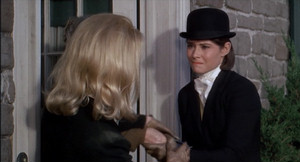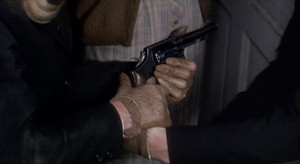This article is a seriously belated contribution to The Film Vituperatem’s Alfred Hitchcock Blog-a-thon. Because I’m lazy and a cheat, I also threw in a dusty screed against Gus Van Sant’s Psycho re-make.
Marnie
In the New Yorker in 1964, Edith Oliver wrote:
“Alfred Hitchcock’s new Marnie is an idiotic and trashy movie with two terrible performances in the leading roles, and I had quite a good time watching it.”
In the second edition The Art of Alfred Hitchcock, Donald Spoto called Marnie
“one of Alfred Hitchcock’s most underrated motion pictures, a tale that routs out a crippling fantasy life. … The enduring value of Marnie lies … in its exploration of the relationship of past to present and the search for authentic personality. … [T]he film might quite accurately be called a meditation on the healing of memories.”
They’re both right. The movie inspires in me a deep ambivalence – easy to discard intellectually but undeniably affecting.
 Marnie is narratively and technically artless – literal and obvious and shrill and nearly naked in its themes and concerns, a story clumsily built around Freudian repression. Its psychology is facile; its score is overbearingly dramatic; and Hitchcock seems hostile toward even the most basic realism with his rear-projection drives and the mechanical horseback riding of the fevered climax. The technique of Marnie is downright standoffish, which could be an appropriate cinematic metaphor for its title character but is easily mistaken for laziness or incompetence.
Marnie is narratively and technically artless – literal and obvious and shrill and nearly naked in its themes and concerns, a story clumsily built around Freudian repression. Its psychology is facile; its score is overbearingly dramatic; and Hitchcock seems hostile toward even the most basic realism with his rear-projection drives and the mechanical horseback riding of the fevered climax. The technique of Marnie is downright standoffish, which could be an appropriate cinematic metaphor for its title character but is easily mistaken for laziness or incompetence.
Yet dismissing Marnie degrades, by association, what is widely considered Hitchcock’s greatest cinematic achievement: Vertigo. There are obvious differences – Vertigo is dreamy, complicated, tragic, and open, while Marnie is grounded, simple, hopeful, and tidy – but the two movies share many genes, and they’re successful in similar ways. Both feature insistent males imposing themselves on unwilling women; the men see themselves as saviors and operate as conquerors. Both films mine the tension between romantic, sweeping tone (courtesy of composer Bernard Herrmann, always eager to couple the male and female leads) and stories of obsession and destruction. Both feature, in secondary roles, sharply drawn, casually sexy women (Diane Baker in Marnie, Barbara Bel Geddes in Vertigo) begging for attention, screen time, and movies of their own.
All those elements contribute to a cinema of the ostensibly incompatible, in which the audience is forced to either reject the movie because of its contradictions of texture and content or work to reconcile them. One can view these films as failures, or look at their apparent problems as invitations for closer inspection. As David Thomson, in his The New Biographical Dictionary of Film, argues:
“His great films are only partly his; they also belong to the minds that interpret them. There is an artistic timidity in Hitchcock that, having put the audience through it, must allow them to come to terms with the experience.”
Marnie is clearly no Vertigo, yet it is not the travesty many people think. The script, by Jay Presson Allen, is earnestly interested in its protagonist, and feels deeply for her. That empathy and sympathy give the movie a directness of purpose that’s rare and refreshing; all it wants to do is understand and fix the poor title character.
Marnie (played by Tippi Hedren) is a thief, a long-con artist who gets jobs with her legs and earns faith with her efficiency. Once she has that trust, she steals from her employer and disappears.
She is calculating, cold, and cunning, but Marnie is plagued by panic attacks triggered by storms, crimson, and men. In the film’s conception, Marnie is a beautiful wild specimen, all the more dangerous because she’s wounded.
But as a criminal, she proves an easy mark for Mark Rutland (Sean Connery), the charming businessman who wants to fuck, study, cage, understand, love, free, and tame Marnie. An amateur zoologist, he catches Marnie stealing from his company and sees an opportunity to indulge his hobby. He forces Marnie to marry him, yet she proves impenetrable psychologically and sexually. His dead wife’s sister, Lil (Baker), can barely contain her jealousy of Marnie and her lust for Mark.
Unlike Vertigo, Marnie isn’t the least bit coy about what it’s up to, full of ripe metaphors and even riper dialogue. It’s disarmingly honest, as when Marnie asks Mark, “You Freud, me Jane?”
Consider some of the movie’s symbols: a purse (the emphasis of the opening shot), horseback riding, a gun, menstrual red. Consider this nearly randomly selected essay on Freudian dream interpretation:
“[A]ll of the referents are concrete things, people, or activities, and similarly all of the symbols, as gun for penis [and] bag for vagina … , are concrete things, people, or activities. In short, something concrete, the symbol, is substituted for something else concrete, the referent. …
“Riding … and shooting symbolize masturbation or coitus. Gun [and] horse are phallic symbols … .”
 The movie practically begs you to psychoanalyze it. When a hysterical Marnie tries to kill an injured horse, she wrestles with Lil over a pistol – the penis to end all misery. In the context of the film, it’s hardly overreaching to find significance in the outcome: Marnie overpowers her impotent de facto rival (now twice-defeated in her effort to secure Mark), roughly handles the instrument, and finds temporary relief in its release.
The movie practically begs you to psychoanalyze it. When a hysterical Marnie tries to kill an injured horse, she wrestles with Lil over a pistol – the penis to end all misery. In the context of the film, it’s hardly overreaching to find significance in the outcome: Marnie overpowers her impotent de facto rival (now twice-defeated in her effort to secure Mark), roughly handles the instrument, and finds temporary relief in its release.
To view the scene less sexually, if the horse represents the title character, the battle over the gun is fundamentally a struggle over who gets to put the creature out of its misery; here, in symbolic terms, Marnie is trying to kill herself (a reading bolstered by her attempted suicide in a cruise-ship pool), and Lil certainly wants to get rid of her.
But Marnie would be unbearable if it were merely a game of Find the Phallus. While it’s easy to joke about this bit of pistol play, the scene is (in the right frame of mind) deeply moving, because it’s only the second time in the movie that we glimpse the genuine humanity of Marnie instead of her steely façade or her instinctive fear.
The first instance comes in a poignant early scene between Marnie and her mother. The elderly woman is clearly enamored with an innocent neighbor girl while she will barely give her own daughter the time of day. “Why don’t you love me, Mama?” Marnie asks.
That moment is the key to the movie, as it establishes in Marnie a vulnerability and a powerlessness in the context of a relationship – even if it is a cliché. When Mark finally figures out that Mother holds the secret to understanding his damaged wife, all that remains is the revelation.
Because Hitchcock has spent two hours building up to this moment, and because we’re dealing with familiar, blunt symbols and cause-and-effect psychology, this conclusion is decidedly anticlimactic – unsurprisingly involving a storm, a man, sex, b
lood, Marnie, and her mother. Viewers can be forgiven for feeling let down, because the outline is exactly as expected.
And the movie’s reductiveness is ridiculous, a cornball assertion that the essence of Marnie’s life – the cause of her pain, the reason she steals – can be found in a single episode. It’s an idea with the most famous precedent in all of cinema: “Rosebud,” stripped of humor and irony.
Yet that’s an ungenerous reading. There’s something tender and touching and sensitive about the re-creation and the film’s ending, and a sense that a barrier has genuinely been demolished. For those who open themselves up to the film, it becomes apparent that the remembrance is not a a single episode at all but merely the breaking point in a highly traumatic youth.
Like Marnie herself, the movie opens up only a little and only briefly, but it’s enough to allow the determined to enter.


What actually happened to the horse? Did Hitch actually have it killed? Marnie was a sexy romantic movie ! The critic here is devoid of depth and understanding ! Still one of my favorite movies ! PS the critic here is on a phallic trip !
I too would like to know if the horse that portrayed “Florio” was killed in real life? I hope not! Then again, it was Hitch who, in reaching for height and depth of terror, ordered a “trained” seagull to be suspended from the ceiling by a wire in THE BIRDS. That seagull crashed into the phone booth in actuality, and some of the glass shards cut the left side of “Tippi” Hedren’s (“Melanie Daniel”‘s) face.
I love Hitchcock’s films (OK, not all of them) — and, yes, the man was a cinematic genius — but I didn’t like the man. He was a sadist (see paragraph above), made unwanted advances on some of his leading ladies, had mother issues (in his fims, at least), and hated eggs-as-food (ref. cig butt put out in sunnyside egg by the mother of Grace Kelly’s “Francie” in TO CATCH A THIEF.